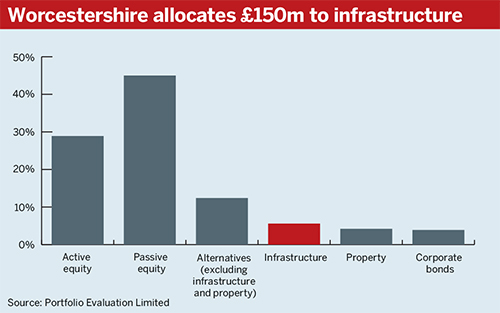The Worcestershire County Council Pension Fund has agreed to split £150m equally between two new overseas infrastructure funds, in the latest stage of an infrastructure investment programme that has run since 2015.
Infrastructure has proven a popular investment in recent years. According to research by UBS Asset Management, 21 per cent of UK schemes invested in infrastructure, private finance initiatives and public-private partnerships – which both finance UK infrastructure – in 2016. In 2008, this figure stood at 14 per cent.
Worcestershire agreed to split the £150m between specialist US infrastructure manager Stonepeak Infrastructure Partners, and specialist European manager First State Investments.
Because it is such a nice asset class for pension schemes the pricing and demand for it has gone up materially over the last few years
Matthew Simms, P-Solve
The circa £2.5bn scheme has also invested in two UK-focused real estate funds, putting £40m towards incumbent manager Invesco, while £20m has been invested with AEW Capital Management.
Infrastructure provides returns and protection
Worcestershire kicked off its infrastructure drive with allocations to the Green Investment Bank and Hermes Investment Management in 2015, when the fund invested in the respective managers’ offshore wind and UK core infrastructure pooled funds.
Mark Forrester, finance manager at the council, said: “Expanding and diversifying the fund’s infrastructure investments to include US and European infrastructure is expected to increase the volume of infrastructure investment opportunities available at optimal prices.”
“Through the pooled funds, the fund will also be able to take advantage of different market cycles and economic conditions.”
 The fund has a recent history of investing across different geographies. In 2015, it placed capital into UK property debt with Venn Partners, US property debt with Walton Street Capital and European property with Invesco.
The fund has a recent history of investing across different geographies. In 2015, it placed capital into UK property debt with Venn Partners, US property debt with Walton Street Capital and European property with Invesco.
Forrester said a combination of infrastructure and real estate pooled funds would allow the fund to maintain projected total portfolio returns, reduce risk and add some inflation hedge to the overall portfolio.
The fund is now turning its attention towards the UK property market, with plans to commit to two UK property pooled funds "in the near future", Forrester added. These will invest in regional UK property with a rental income focus.
Going abroad carries risk
Investing in infrastructure overseas may be a sensible way to capture value and avoid an overvalued market. Schemes must, however, accept an additional layer of uncertainty in foreign markets.
Mike Weston, chief executive at the Pensions Infrastructure Platform, emphasised the relatively straightforward and low-risk nature of investing in UK infrastructure.
The benefits of domestic infrastructure investment include an understanding of the UK’s regulatory and political environment, and the absence of currency risk.
“As soon as you go overseas… you are automatically going up the risk curve, because you’re investing in territories where, as a UK investor, however much research you put into it, you’re never going to know the political and legal environment in as much detail,” Weston said.
“You’ve got currency risk and if you’re doing a long-term 20 year investment, [it’s] quite difficult to hedge for that period of time,” he added.
Value still exists in infrastructure
Rising investor interest in the asset class has eroded value in certain parts of the infrastructure market. Matthew Simms, director at consultancy P-Solve, said: “Although it would be attractive for all pension schemes to invest in infrastructure, the pricing isn’t fantastic.”
Nilgosc outvotes social infrastructure sceptics
The Northern Ireland Local Government Superannuation Committee has voted for social infrastructure as a suitable investment type, despite concerns among some committee members about political risk and the impact on public services.
He explained that “because it is such a nice asset class for pension schemes… the pricing and demand for it has gone up materially over the last few years”.
Graham Matthews is chief investment officer of specialist fund manager Whitehelm Capital. He noted the costly nature of large-cap unlisted infrastructure assets, which hold an enterprise value of at least £1bn.
“It’s not unusual for those types of assets in the current market to be trading at 20, 25, even 30-times operating profit, which [are] historically very high prices,” he said.
However, “in other areas we still see great value”, Matthews said, citing small and mid-cap unlisted infrastructure equity, high-yield infrastructure debt and listed infrastructure equity.

























